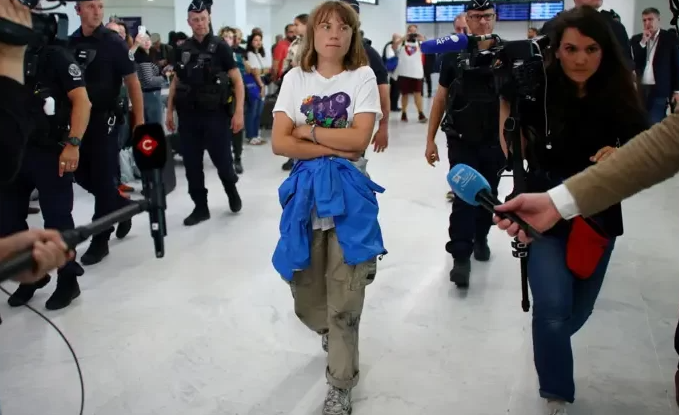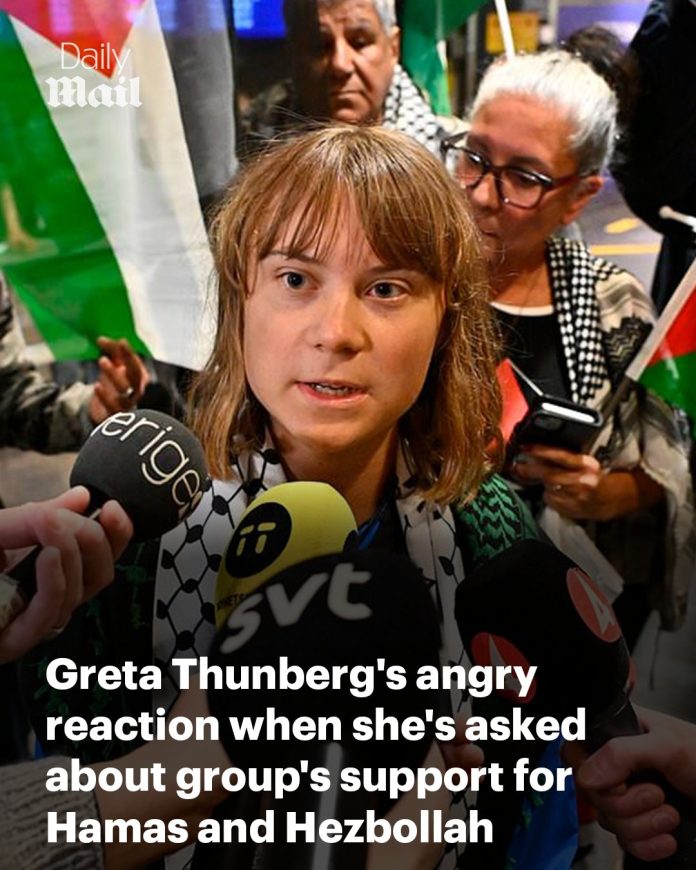On June 1, 2025, Swedish activist Greta Thunberg joined the Freedom Flotilla Coalition, boarding the UK-flagged vessel Madleen from Catania, Sicily. The flotilla aimed to challenge Israel’s longstanding naval blockade on Gaza by delivering humanitarian aid—baby formula, flour, rice, diapers, medical kits, even crutches. The mission sought not only to provide relief but also to spotlight the blockade’s humanitarian impact.

The Interception at Sea
In the early hours of June 9, Israeli naval forces intercepted and seized the Madleen in international waters, enforcing the blockade imposed since 2007 and significantly tightened during the Israel–Hamas war. Activists described the seizure as a “kidnapping,” but officials emphasized it was a lawful blockade enforcement. The vessel had even been coated with a white irritant spray and was escorted to the port of Ashdod.
Upon arrival, Thunberg and eleven others were detained, interrogated, and shown footage of the October 7 Hamas attack—a step that some activists reportedly refused. While most detainees were deported, a few—including French MEP Rima Hassan—faced legal proceedings after refusing to leave.
Thunberg’s Deportation and Statements
On June 10, Israel deported Greta Thunberg aboard a flight via Paris back to Sweden. The Israeli Foreign Ministry defended its actions as lawful and security-driven, calling the mission a “publicity stunt” and dismissing critics as having engaged in “Instagram activism”.
Once back in Europe, Thunberg described her detention and deportation as akin to being “kidnapped” from international waters—asserting that international maritime and human rights laws had been violated. She stated, “we have been intercepted and kidnapped,” calling on global citizens to pressure their governments for humanitarian access and an end to the Gaza occupation.
Confrontation and Criticism
During a press briefing, Thunberg was asked about reports that some flotilla members expressed support for Hamas or Hezbollah. Her visibly frustrated response—highlighting lack of awareness due to limited phone access and asserting she wasn’t aware of such sympathies—ignited backlash.
Israeli authorities accused the flotilla of harboring extremists: individuals onboard included activists who openly praised Hezbollah’s Hassan Nasrallah or celebrated attacks on Israel. Allegations also emerged that participants destroyed electronics to avoid scrutiny—but importantly, this occurred as soldiers boarded in international waters.
Global Reaction and Media Coverage
The interception sparked diverse reactions:
- Celebrity support: Artists like Garbage, Cat Power, Aurora, and Kneecap rallied behind Thunberg. Garbage called for “the release of all involved immediately,” while Cat Power criticized the detention as a violation of international law.
- Critique of mission’s effectiveness: Commentators like Forward’s Nora Berman questioned the flotilla’s real-world benefits, calling it a spectacle that distracted from more urgent humanitarian efforts.
- Political responses: U.S. Senator Lindsey Graham threatened military intervention, drawing backlash. Amnesty International and human rights groups condemned the seizure as illegal under international law.

A striking photo emerged of Thunberg calmly holding a plastic-wrapped sandwich provided by Israeli personnel—drawing ridicule online and causing Israelis to label the “kidnap” narrative as overblown theatre.
Thunberg’s Defiance and Future Plans
Far from retreating, Thunberg defiantly urged more activism: “We need more young angry women,” responding to Donald Trump’s mocking suggestion that she needs anger management. She affirmed her intent to continue humanitarian missions and global advocacy for Palestinians.
Broader Context and Takeaways
This flotilla marks the latest chapter in a series of high‑profile aid missions. In May, the similar vessel Conscience suffered a drone strike near Malta—highlighting escalating tensions around such operations.
The broader Gaza blockade—ongoing since 2007 and intensified after October 2023—has led to widespread humanitarian concerns, with UN agencies warning few civilians receive adequate aid and accusing Israel of exacerbating famine-like conditions.
For Thunberg, the mission represents a deliberate shift from environmental activism to humanitarian and justice-driven protest. Critics dismiss it as self-promotion; supporters view it as a brave, necessary challenge to silence and suffering. With her return and defiance, she’s made it clear this won’t be her last act of civil protest.
In conclusion, Greta Thunberg’s interception aboard the Madleen has sparked a global conversation on the ethics of activism, military blockades, press freedoms, and individual responsibility. Whether hailed as heroism or criticized as a PR ploy, the flotilla has drawn unprecedented attention to Gaza’s humanitarian crisis—and Thunberg herself has signaled that she’s just getting started.

















